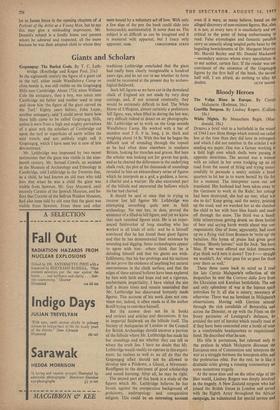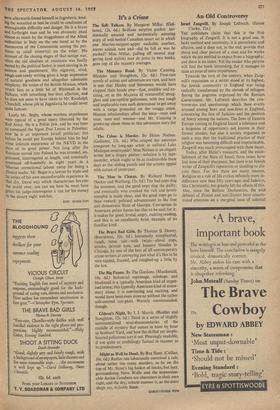Bloody Heroes
DURING a brief visit to a battlefield in the winter of 1944 I saw three things which moved me rather less at the time than they did later in retrospect, and which I did not mention in the articles I was sending my paper. One Was a farmer working in a field high over which shells were passing in opposite directions. The second was a woman with an infant in her arms trudging up an icy road from the sound of firing and trying unsuc- cessfully to persuade a sentry outside a head- quarters to let her in to warm herself by the fire for a moment. The interpreter came out and translated. Her husband had been taken away by the Germans to work in the Ruhr; her cottage had been destroyed; she had no one; what was she to do? Keep going, said the sentry, pointing up the road; and we watched her as she clutched the child to her with bare blue hands and made off through the snow. The third was a bandy little infantryman getting drunk on three bottles of beer and saying harsh words about war cor. respondents. One of them, apparently, had come up on a flying visit from Brussels to 'write up' the battalion. His hymn of praise had given great offence. 'Bloody heroes!' said the Jock. 'See here, Mac. If we were offered our ticket tomorrow, d'ye think we'd turn it down? Too f— straight we wouldn't. An' what goes for us goes for than over there as well.'
These three came back to mind as I read the late Curzio Malaparte's collection of the despatches he sent the Corriere della Sera front the Ukrainian and Karelian battlefields. The one and only splendour of war is the human spirit unbroken by it; all else is misery, necessary of otherwise. There was no bombast in Malaparte's observations. Moving with German armour through the rich cornfields of Bessarabia and across the Dniester, or up with the Finns on the frosty perimeter of Leningrad's defences, he avoided the sort of heroics which usually read as if they have been concocted over a bottle of wine in a comfortable headquarters or requisitioned hotel. He described what he saw.
His title is portentous, but relevant only to the preface in which Malaparte discusses the European-ness of Communism and interprets the war as a struggle between the bourgeois ethic and the proletarian ethic. For the rest, he is like a dramatic critic giving a running commentary on some monstrous tragedy.
At the same time and on the other edge of the Slav world, Lindsay Rogers was deeply involved in the tragedy. A New Zealand surgeon who had joined the British forces in London and served with the Eighth Army throughout the African campaign, he volunteered for special service and
soon afterwards found himself in Jugoslavia, tend- ing the wounded as best he could in conditions of unimaginable difficulty and danger. He is a brave and forthright man and he was obviously irked almost as much by the sluggishness of the Allied authorities in Italy on the one hand as by the manoeuvres of the Communists among the par- tisans (a small minority) on the other. His account of the closing stages of that, savage war, When the old idealism of resistance was finally ousted by the political factor, is most moving in its sadness and puzzlement. His vigorous, vivid, rough-and-ready writing gives a large impression of natural goodness and altogether admirable simplicity. He writes of the British Mission, which struck him as a little bit of Whitehall in the Balkans, with something less than affection, and he does not seem to have taken to Mr. Randolph Churchill, whose job in Jugoslavia he could never quite fathom.
Lastly Mr. Begin, whose wartime experiences were typical of a great many liberated by the Red Army. He is a Polish Jew, and he was later to command the Irgun Zvai Leumi in Palestine; now he is an important Israeli politician; but before he could put Europe behind him he had some intimate experience of the NKVD in the days of its great power. Not long after the Russians moved into Poland he was arrested, im- prisoned, interrogated at length, and eventually sentenced off-handedly to eight years in a Siberian correctional labour camp for being a Zionist leader. Mr. Begin is a lawyer by trade and he writes of his own uncomfortable experience in that dry, literal way which characterises lawyers the world over; one can see how he must have given his judge-interrogator a run for his money in the dreary night watches.
IAIN HAMILTON































 Previous page
Previous page